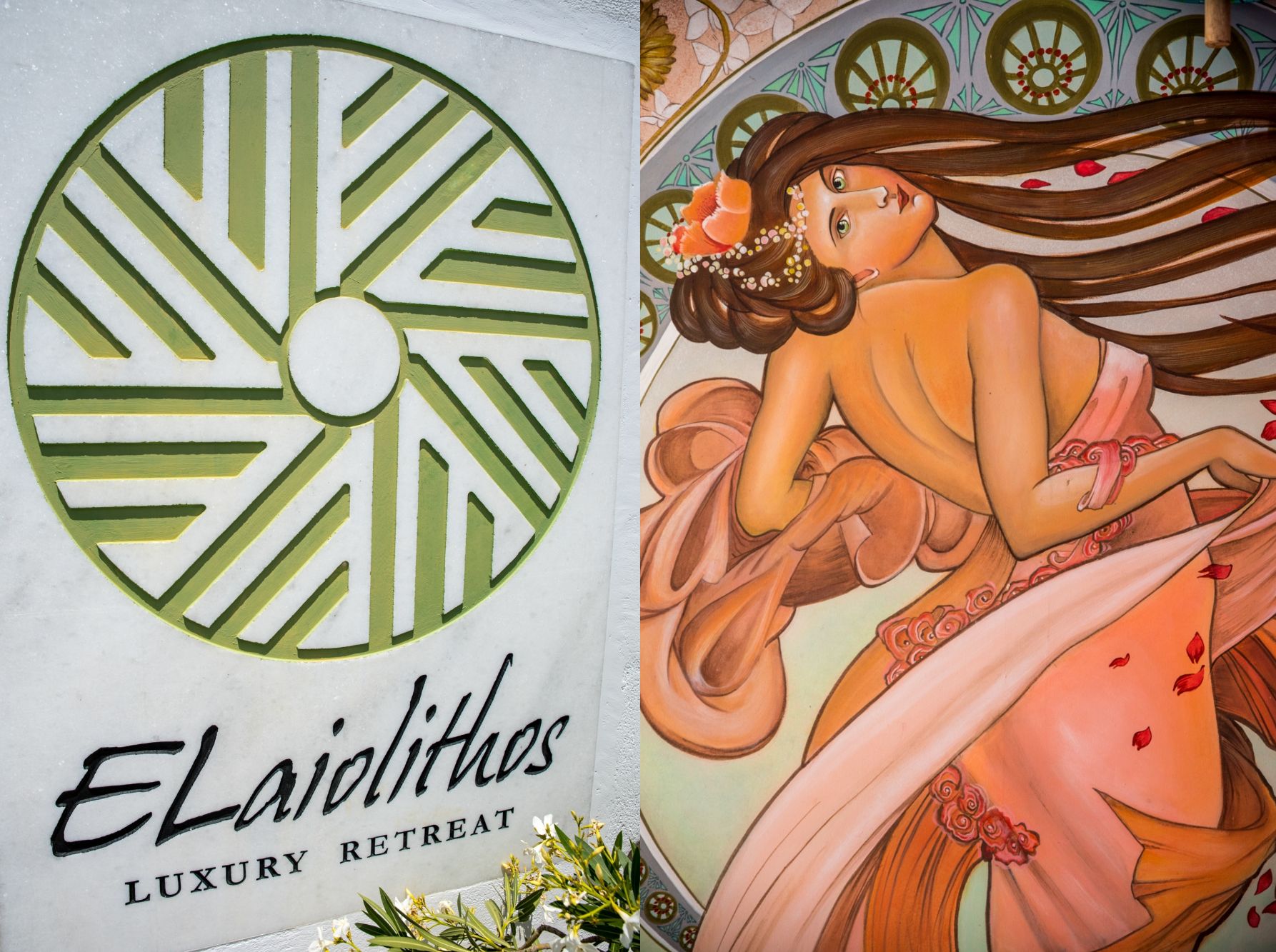The Helen of Troy in Naxos – Luxury and History – A Mythical Stay:
ELaiolithos’ themed suite “Oraia ELeni” – Helen of Troy – The Beautiful Helen – becomes the opportunity for us to dive into the myth, the riddles, and the reality of the Trojan War, and its heroes.
Facts and legends are surrounding one of the most enigmatic and famous figures of all times – the Oraia ELeni (Helen of Troy). A mythical and well-known person, the Beautiful Helen – the myth of the “fatal woman” has been the favorite subject of many stories from the depths of history. The first written record of Helen is in Homer’s Iliad. However, the origins of the myth that surrounds her date back to the Bronze Age. Hesiod awarded her the title of the most beautiful woman in the world: even today, the Bronze Age princess remains the epitome of flawless female beauty. The beautiful Helen of Sparta, Helen of Troy, of Theseus, of Menelaus, of Paris, of Deiphobus, of Odysseus, of Achilles.
Helen is a name that has been associated with royalty, and with a slew of legendary people over the centuries. She is potentially the best known and most frequently painted woman in the West, aside from the Virgin Mary and Eve. Artists throughout all times have repeatedly envisaged Helen through a contemporary lens, shaping and reshaping her to suit current ideologies concerning beauty, sexuality, marriage, and feminine power.

Meaning of Name:
According to Greek legend, Helen of Troy was supposedly born in 1214 BC. Helen of Troy, (Greek: Helen, Helena / Ancient Greek: Ἑλένη Helénē, pronounced helénɛ), in Greek legend, is the ultimate in human beauty, the personification of ideal beauty. Even Aphrodite herself identifies Helen as the most beautiful woman in the world. The name Helen (Ἑλένη) means: The Shining Light, Torch, Sun Ray, Bright (could also come from the Greek selene, meaning “moon” or “hlios” meaning “sun”.) She represents the unknowable and mysterious quality of women, the archetype of goddess and lover.
Helen of Troy is a character in Homer’s classic epic poem, the “Iliad,” written in the 8th century about the Trojan War, imagined by the Greeks to have occurred about 500 years earlier. Her story is one of the most dramatic love stories of all time, and is said to be one of the main reasons for a 10-year war between the Greeks and Trojans, known as the Trojan War. The English playwright, Christopher Marlowe, called Helen, “the face that launched a thousand ships” because of the vast number of warships the Greeks sailed to Troy to retrieve Helen.
Who was Eleni after all?
The public imagination of Helen of Troy has been continued virtually uninterrupted to the present day, inspiring countless books, films, television shows, and artistic pieces. She has gathered around her a multitude of praisers as well as critics. Even the modern international expression “Serce la femme” (= seek the woman – as a cause) brings the memory back to her.
In the world of art, as in literature, Helen emerges as both the epitome of feminine beauty and enigmatic persona, and as a potent symbol of the destruction the irresistible beauty can wield
Five marriages, several children, two wars and an interesting afterlife. 99 suitors —including Odysseus—came from all parts of Greece. Helen chose as her husband the king of Sparta, Menelaus, Agamemnon’s younger brother.
An Estimate of Dates in Helen’s Life:
- 1214 BCE – her birth to Leda
- 1202 BCE – her intimacy with Theseus and possible birth of 1 child.
- 1201 BCE – her marriage to Menelaus and subsequent birth of 5 children.
- 1195 BCE – Paris abducts her against her will – she had 5 more children with Paris
- 1186 BCE – Start of Trojan war
- 1176 BCE – End of Trojan war – she leaves with Menelaus
- 1168 BCE – She arrives back at Sparta after 8 years in Egypt
- 1166 BCE – Telemachus visits her for news of Odysseus.
- 1146 BCE – Her death at an old age.
Was she a goddess or a mere mortal?
Homer has told in the Iliad that Oraia ELeni is an erotic goddess petitioned for romantic and domestic happiness. She is also invoked for fertility and assists conception.
To the Greeks, she was Helen of Sparta. What is known about Spartan women is that they enjoy several freedoms: the opportunity to be economically independent, they could ride, they were trained in music and poetry recitals. Their education included racing, wrestling, throwing the discus and javelin, as well as trials of strength. The girls enjoyed the same food rations as boys and drank unwatered wine.
Did she go to Troy with Paris or not? Was she the cause of the Trojan War?
Helen the Beautiful was famous for her beauty and was the wife of the king of Sparta, Menelaus. However, when she abandoned (or abduction – there is a contradiction about either one) him and ran away with Paris, the Trojan War began, which lasted 10 whole years – until the resourceful Odysseus thought of making the Trojan Horse, a hollow wooden horse and hiding inside it. This is how the Greek army managed to win the war with this trick.
The legends of Helen during her time in Troy are contradictory. Ultimately, Paris was killed in action, and in Homer’s account, Helen was rescued and reunited with Menelaus. In classical Greece art, her abduction by Paris or escape with him was a popular motif. In medieval illustrations, this event was frequently portrayed as a seduction. In Renaissance paintings, it was usually depicted as rape and abduction by Paris.
Every self-respecting novel contains all the ingredients of human passion: love, hate, intrigue, war, uprooting, adventure, blood, scandal, mystery, punishment. And mostly heroes. Rather, the archetypal novel of this world. The Trojan War gave birth not only to the Homeric epics, but also to Greek writing and world theater (with ancient tragedy) and much more.
Homer in the Iliad does not have any kind of description of Helen the Beautiful, if she is blonde or brunette, short or tall. He lets every Greek dream of the Beautiful Helen as he wishes
Did Troy ever rise again?
Troy was destroyed by war about 3200 years ago – an event that may have inspired Homer to write the Iliad so many years later. But the famous city rose again, reinventing itself to fit a new political landscape.
Greek Mythology and Helen
- Homer calls that the Olympian king of the Gods Zeus seduced Leda and fathered Helen thus acting according to this myth as a blood sister of the Dioscuri Castor and Polydeuces.
- According to another legend-version he had transformed into a goose, and seduced Nemesis, the daughter of Night.
** Whoever is the mother, in both versions, Helen is born from an egg in Sparta.
The basic myth in which Zeus becomes the father of Dioscuri and Helen is accompanied by wonderful incidents, parts of which are also found in foreign mythologies. In particular, the main heavenly power, Zeus, in order to conquer the beautiful Leda, transforms into a white swan, directing his pursuit by an eagle transformed into the goddess Aphrodite, (anthropomorphic concept of beauty). Faced with the pursued white swan, Leda immediately took him in her arms. From this meeting, Leda gave birth to two eggs where, after nine months of hatching, one gave birth to the brilliant Dioscuri and from the other the Beautiful Helen, who would become luminous deities.
In this myth, Leda becomes the personification of the night when, at the last stage, she emerges towards the east as if chasing the white swan (the white shade of the sky at twilight) where, taking him in her arms, a little later the two stars that illuminate are born the world as well as their luminous energy (Helen) which affects nature accordingly.
Some Interpretation and Understanding:
In wars, nothing is quite as it seems, at first glance. Here we are dealing with a dominant superpower (the Bronze Age and the mighty Mycenaean civilization, around 1200 – 1250 BC of Europe which ends up threatening the dominance of Asia, which belonged to the Persians. The new – scrutinizing the ancient sources and the strategic – historical research, that’s where they end up, in two words. Thus, the Persians got the right to “retaliate” with the Persian Wars, on the land of Europe at the time at the Battle of Marathon, Battle of Salamis, Battle of Thermopylae, and the destruction of the Acropolis of Athens.
How Homer “saw”, poetically, the Trojan War? What is the essence, the message, eternal and universal of his primary novel?
That the winner shares humanity even with the most vulnerable of the vanquished. And, above all, that pure and unadulterated victory in war does not exist.
The Iliad teaches us that in War there are no winners and losers. A war epic condemns war! A message to which the ancient tragedians came to bid, like Euripides, in the words of Poseidon in his iconic, anti-war “Troys”: “He who conquers cities is a fool. After desolating temples and sanctuaries and tombs, he himself then perishes.”
Or Neoptolemus in Sophocles’ Philoctetes: “War prefers to kill, not the coward, but always the brave.”
The Greatness of “Beautiful Helen”
What is another version of the above reality – the abduction of Helen the Beautiful by the Trojans, by Paris, and the reaction of the Achaeans, according to the novel?
We’re talking about the primary novel of the civilized world (if we consider that the next one, of universal radiation, was the birth of Christ, which divided History into before and after, with the largely arbitrary year “0”). Which also had heroes. Delineating the protagonists of the Trojan War takes up almost half of the 15,693 Homeric verses of the Iliad.
The abduction of Helen by Paris reflects the ancient idea of women as trophies that can be taken from an enemy. Victorious soldiers commonly took the women of their fallen enemies as slaves, in the myth, but Paris actually provokes a war by taking Helen with him while Menelaus is away.
Commentators-agree on Helen of Troy’s powerful erotic appeal and her potential to cause havoc, but they differ wildly on questions about the nature of her character and adultery. Helen understood that words are the most important things in the world.
She was imagined to be a direct avatar of the kalon kakon – the beautiful evil, from whom even so many thousands of years later we turn to be caught, in the difficult times. That always vibrates and moves us. From the same novel the emblematic ancient tragedies were born, which in fact stepped on the epics of Homer to describe the eternal human passions.
For millennia, Helen of Troy has been many things to many people
Helen is a symbol. She represents honor. She represents glory. She represents valor. By owning her, one owns all those things. She is only an object to both sides of the way. Their fighting will continue until they unarguably possess Helen and any other women they demand belongs to them. The possession of a woman valued as highly as Helen is necessary meaning a man possesses valor and other masculine virtues. Valor is why they fight. Honor is why they fight. Dignity is why they fight. They use Helen as an excuse, with some even hating her for what they believe she has done, but others see this as a fortunate opportunity. Battle separates those with valor from those that do not have it.
The beautiful Helen looks like how each of us perceives the beautiful. It is not imprisoned in any preconceived description. We, everyone, have the ability to create it in our minds as each one wishes. Helen of Troy represents not a real woman but an idea
Beyond serving as an index of the prevailing ideals of beauty and femininity of each generation, Helen’s liminality allowed painters in every period to have interpreted, modified, and embellished her character in disparate and contradictory terms to appropriate her story and its meaning, and project onto her pervasive male anxieties and fears surrounding the threatening power of female beauty and sexuality. Though the guises Helen takes on vary widely depending on the cultural context in which she is created every time, her function has and will remain largely the same: to incarnate femininity at its most desirable and most destructive.
What is the message and spiritual meaning of Helen of Troy, the Trojan War and its heroes:
Helen, the stake of the war, belongs to the lineage of Sparta, that of the resurgence of what is new. The Trojan War represents the inner human battle with the aim of discerning the best path for reaching a greater freedom brought by the intuitive mind, and the pursuit of the process of separation of spirit and matter (they’re the Trojans), or that of aspiration allied to the purification of the depths (the Achaean coalition supported by Achilles’ Myrmidons).
Agamemnon is the greatest aspiration because he is the one hesitated but did not intervene at the end in favor of his brother Menelaus. He is the directing movement and he represents the search of a betterment of man towards a superior wisdom who is represented by Clytemnestra, who is not able to conceive that the new must orient itself towards a radical transformation. Agamemnon is the only one who is able to discern the best path towards freedom, who is Helen, that is the one who is an unwavering will fixed on its goal.
Helen is the most beautiful of mortals, and she represents the truest evolutionary path towards ELeutheria (liberty.) As the daughter of Leda, she belongs to the lineage of Protogenia, that of the adventurers of consciousness. She has Zeus as divine father and Tyndareus as human father, which places her within the lineage of the Pleiad Taygete which is the symbol of the plane of the intuitive mind or intuition which precedes the overmind, and that is the last plane being incarnated by the Pleiad Maia, the mother of Hermes god.
Helen represents the highest conception of evolutionary truth accessible to the spirit, a truth which remains governed by the world of the gods, that of the overmind. It is only by the light that the seeker will become the light to himself equal to that of the gods
Helen’s suitors therefore represent a number of paths seeking to put themselves forward as the best able to lead to this greatest freedom. This indicates and it’s obvious that the seeker and his path towards greater freedom includes a rejection of the human dimension. Given this, it is therefore of little importance whether it was Helen or Paris who was first seduced.
The Trojan side represents the most advanced state of spiritual progression in the ascension of the planes of consciousness, that of the liberated in spirit, which is near to equality and to the state of joy. This state allows a liberation of the vital to a certain degree, allowing access to non-duality in the vital or the perfection of sainthood, although this is not wholly acquired because the horses of Trojans were not immortal.
The Trojan war illustrates the rejection of a sole personal accomplishment, represented by the Trojan coalition, and a quest for a higher truth incarnated by Helen, who was married to Menelaus, a hero of the Achaean coalition. While this illustrates an inner battle, it also expresses an opposition between different currents of Greek spirituality of that period. Ulysses, is the one who strives for the union of the two currents which unite the spirit with the matter and therefore also the equilibrium between the masculine and feminine polarities.
What can you learn from Helen of Troy? Here are some invaluable lessons from the Troy War, some common morals that most people agree on:
- Carry out reconciliation carefully
- Always tell the truth.
- Have courage.
- Keep your promises.
- Treat others as you want to be treated.
- There would be opportunists everywhere.
- Disregarding a mistake is more dangerous than making it.
- Never judge a book by its cover.
- To make someone do something for you, tell them how they will be benefited.
- Assess your opponent before getting into a fight with them.
- You need to serve in order to lead.
- High achievers have clear vision and conviction.
- Vision/Mission of glory creates fears and needs strategies.
- Never underestimate the power of your enemy.
- Make short term and long term plans.
- Irrational predictions may lead you to doom.
- Always leave room for the surprise element.
- Greed and fear plays a prominent role throughout ages.
- We should learn how to respect even those whom we dislike – The real Integrity!
- No one wins in a War.
- Nothing is absolute.
ELaiolithos’ Luxury Suite: Oraia ELeni (Helen of Troy) Suite

Experience the seamless integration of authenticity, beauty, and novelty at ELaiolithos. Step into the legendary ambiance of the Oraia ELeni suite and embark on a journey back in time, immersing yourself in the captivating mythological atmosphere that permeates every corner of our retreat.

Step back in time to the Mycenaean age of Greece with our luxurious Oraia ELeni suite, paying homage to the legendary Helen of Troy. Immerse yourself in the allure of Greek culture as you indulge in lavish days and nights within this opulent sanctuary. Featuring en-suite vaulted bathrooms, artistic interiors, and a spacious balcony offering panoramic views of Zeus mountain, the verdant Cycladic valley, and the Aegean Sea, your stay in the “Oraia ELeni Suite” promises an unforgettable journey into the past.

In ELaiolithos’ Oraia Eleni suite, you’re enveloped in the essence of Helen of Troy—a space brimming with romance, intrigue, and allure. Dominating the suite is a colossal oil painting depicting the legendary face that launched a thousand ships. The oversized King bed offers unparalleled indulgence, complemented by the expansive bedroom designed to lavish you with comfort every day. Whether you seek intimacy with your loved one or simply crave spacious luxury, this meticulously crafted bed promises aristocratic comfort and unparalleled opulence.

Prepare for the epitome of stylish relaxation. Our colossal bed seamlessly blends traditional Cycladic design with a touch of contemporary urban chic. Handcrafted from cement, the bed exudes Cycladic charm while offering modern comfort. The exquisite built-in headboard adds a local touch, featuring a depiction of the stunning scenery, including the iconic pyramid-shaped mountains of Zeus on the horizon.
This exquisite suite epitomizes the essence of its legendary namesake, Helen of Troy. Radiating romance and timeless charm, every detail within exudes an unforgettable ambiance, destined to become a cherished memory of your honeymoon, anniversary, or special Greek getaway.

The Oraia Eleni suite is a visual delight, epitomizing the essence of a luxurious holiday experience. Its ambiance evokes a sense of timeless allure, blending mythological charm with modern elegance. Moreover, the suite upholds impressive sustainability standards. Every element is meticulously selected, ensuring traceability, ethical sourcing, and environmental responsibility.
You enter the world of “Oraia ELeni” (Helen of Troy) and sleep in her Palace. An elegant space to enjoy your privacy. Romance is spread everywhere!
Article written by Copyright © Helen Marakis. All rights reserved







